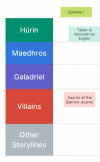Nicholas Palazzo
Well-Known Member
We're coming back for another season and I couldn't be more excited! So much violence is going to ensue!
We're starting up March 1st, at 8 PM Eastern, so feel free to reach out if you'd like the Zoom link. Otherwise, we'll be broadcasting at http://twitch.tv/signum.
We're starting up March 1st, at 8 PM Eastern, so feel free to reach out if you'd like the Zoom link. Otherwise, we'll be broadcasting at http://twitch.tv/signum.



